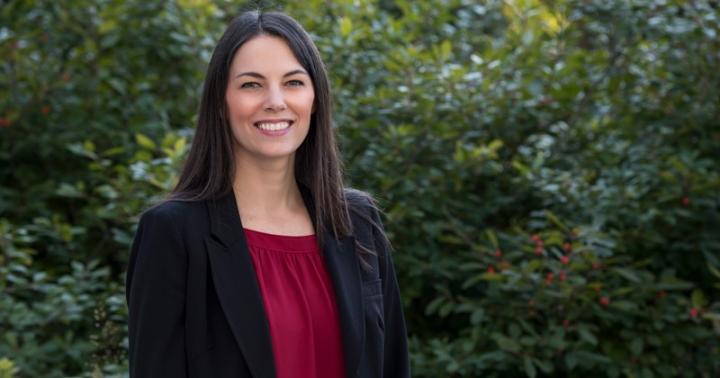UD’s Emily Day among researchers funded through Science Center program

Credit: Photo by Kathy F. Atkinson
University of Delaware biomedical engineer Emily Day is working on technology that may one day replace bone marrow transplants.
Currently, bone marrow transplants are used to replace damaged bone marrow in the body with healthy blood stem cells, which give rise to all blood cell types in the human body.
Day, an assistant professor in the College of Engineering, is developing nanoparticle carrier systems to deliver therapeutic treatment directly to stem cells without the need to remove them from the body. It is a platform technology with the potential to transform the treatment of benign and malignant blood disorders including HIV, cancer, aplastic anemia and sickle cell disease.
Now, with $200,000 in new funding through a QED grant from the University City Science Center in Philadelphia, Day will test whether methods developed in the lab are effective and can be commercialized. QED is short for quod erat demonstrandum, a Latin phrase meaning proven as demonstrated.
Day and her research group were among three teams selected from among 45 applicants from eight institutions in the Greater Philadelphia region for the QED Proof-of-Concept Program, designed to help researchers commercialize their work. Equally funded through the QED program and UD, the grant helps researchers effectively bridge the gap between academic research and product commercialization.
“Most of these diseases, currently, are treated by bone marrow transplants, which are difficult for patients and are expensive,” said Day. “We hope our nanoparticle delivery vehicles can enable the repair of abnormal bone marrow in the body, improving the patient experience and leading to better outcomes.”
Additionally, the UD team’s work will provide a valuable research tool to improve the understanding of blood stem cell biology. Blood stem cells are important targets for therapies. This is because when they fail, it can lead to a number of diseases or disorders.
Day’s research group, in collaboration with UD chemical engineer Terry Papoutsakis, already has successfully demonstrated that membrane-wrapped nanoparticles can target and deliver cargo to blood stem cells in the lab. With the QED funding, the research team will test whether these same methods are effective “in vivo,” or in living organisms.
Two other UD teams, led by X. Lucas Lu and Matthew Hudson, also were finalists in the 2020 competition. Lu, an associate professor of mechanical engineering, is working on a device for capturing tumor cells out of the blood stream. Hudson, an assistant professor in the College of Health Sciences, is working on drug delivery techniques using cell fragments.
Accelerating promising biotechnology
Since the program’s inception in 2009, the Science Center’s QED program has provided development services for over 100 academic researchers with over $8 million invested in 41 projects. This has led to 18 startups or licensing deals.
To-date, UD researchers now have secured $800,000 in QED funding to drive forward innovative technologies and research related to cerebral palsy, educational tools for healthcare, prostate cancer and blood disorders. QED-funded research teams receive business support from the University’s Office of Economic Innovation and Partnerships (OEIP), as well as customized coaching from industry experts.
“Exposure to the investment community and support in developing a commercialization funding road map can be pivotal to successfully transferring technology from an academic setting to the marketplace,” said Joy Goswami, assistant director of technology transfer and corporate partnerships, which is housed in OEIP. “We look forward to supporting Dr. Day and her team in their commercialization journey.”
###
OEIP also serves Delaware State University (DSU), which, along with UD, is among 21 partner institutions that participate in the QED program from Delaware, Pennsylvania and New Jersey.
Media Contact
Peter Kerwin
[email protected]
302-831-8749
Original Source
https:/




